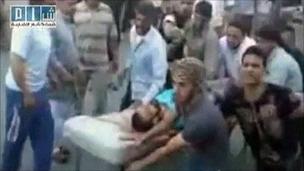 US President Barack Obama has condemned the Syrian authorities' crackdown on protesters on Sunday, which activists say has left more than 130 dead.
US President Barack Obama has condemned the Syrian authorities' crackdown on protesters on Sunday, which activists say has left more than 130 dead.
Mr Obama said he was appalled by the government's use of brutality against its own people and promised to work to isolate President Bashar al-Assad.
Security forces killed dozens in the city of Hama on Sunday.
The government said troops were sent to Hama to remove barricades erected by the protesters.
But an official at the US embassy in Damascus dismissed those claims as "nonsense", saying the government had launched "full-on warfare" against its own people.
In an interview with the BBC on Monday, UK Foreign Secretary William Hague called for stronger international pressure on Syria.
"We do want to see additional sanctions. We want to see stronger international pressure all round. Of course, to be effective, that can't just be pressure from Western nations, that includes from Arab nations, it includes from Turkey," Mr Hague said.
Seeking military action against Syria, even with UN authority, was "not a remote possibility", he added.
Also on Monday, President Assad praised the military for "foiling the enemies" of the state, the official news agency reported.
"[The army's] efforts and sacrifices will be admired," he said.
'Legitimate grievances'
Mr Obama said the reports from Hama were horrifying and demonstrated the true character of the Syrian regime.
"Once again, President Assad has shown that he is completely incapable and unwilling to respond to the legitimate grievances of the Syrian people," he said.
Mr Obama said he was appalled by the government's use of "violence and brutality against its own people".
Ministers from France and Germany also condemned the day's violence.
Germany, currently a UN Security Council member, has requested emergency discussions in New York on Monday.
Dawn attack
The military had pulled out of Hama a month ago, remaining on the outskirts and putting the city under a virtual siege.
Tanks and troops re-entered Hama at dawn on Sunday, attacking civilians with shells and machine-gun fire, according to witnesses.
Hospitals soon complained of being overwhelmed by the numbers of dead and wounded, and local residents said they had received appeals for blood donations.
Activists and residents said more than 100 people had been killed by the time the tanks rolled out again at dusk.
Elsewhere in Syria, reports said about 30 people had been killed on Sunday amid widespread unrest.
Security forces cracked down on protests in two suburbs of Damascus, and there were reports of mass arrests and fatal shootings in the southern town of Hirak and the eastern provincial capital of Deir al-Zour.
The government said five soldiers, including a colonel, were killed in clashes with protesters across the country.
'Foreign interference'
The protests began in mid-March, inspired by the uprisings in Egypt and Tunisia.
Although Mr Assad has offered concessions and reforms, the government has also carried out periodic crackdowns and activists say more than 1,500 civilians and 350 security personnel have been killed since March.
More than 12,600 people have also been arrested and 3,000 others are reported missing.
Many of the protesters have turned more radical in the face of government repression, demanding that the president step down.
The Syrian government has repeatedly accused foreign-backed extremists of armed criminal gangs of stirring up trouble.
In a statement on the state news agency Sana on Sunday, the government said armed groups had "set police stations on fire, vandalised public and private properties, set roadblocks and barricades and burned tyres at the entrance of Hama".
"Army units are removing the barricades and roadblocks set by the armed groups at the entrance of the city," the statement said.
Most foreign journalists are banned from the country, making it difficult to verify reports.



